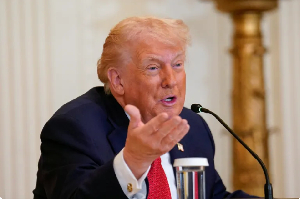*By Edward Kutsoati *
A “silent revolution” on corruption, as Aremeyaw Anas calls it, may now be
underway in Ghana, following his recent revelations of corrupt practices at
Ghana’s main ship port at Tema. About a dozen officials of Customs, Excise
and Preventive Service (CEPS) will lose their jobs, and face the law.
Several more will be reassigned away from Tema ship port. These are
encouraging steps, but pretty far from what will be needed to stem corrupt
practices everywhere in Ghana so the country can create a better,
business-friendly economy.
The good thing is that, the “Anas tapes” has rekindled the debate on
corruption (including its causes and costs) and there have been loads of
suggestions on how to nip it in the bud. Most are not new, and all point to
a committed leadership. Others (e.g., the think-tank IMANI) advocate a
reduction in taxes and duties at the shipping ports so individuals and
businesses will have less incentive to substitute bribery for their tax
obligations. I like this idea; supported by the Laffer curve (named after
Art Laffer) which demonstrates that, beyond a certain tax rate, government
tax revenues actually falls with higher taxes, both due to the disincentive
to work (at a higher tax rate) and tax avoidance. The idea is applied in
Switzerland, where tax rates are low and there is almost 100 percent
compliance rate. However, alone, lower taxes will not eliminate corruption
in Ghana, at least not in the short to medium term.
If Ghana’s leaders really want to reduce, and hopefully eliminate
corruption, it will help to learn from success stories elsewhere. The ‘*
Jhang*’ model is particularly instructive: it is simple, cheap and
transparent – the basic requirements for a sustainable anti-corruption
strategy. More importantly, the main actors in this model are the people,
those who stand to benefit the most from a corruption-free society, with
help from their mobile phones. The strategy, a brainchild of Mr. Zubair
Bhatti, involves an audit (phone calls) to ascertain customer feedback, and
whether or not they were made to pay a bribe for a service.
Jhang District in the province of Punjab, Pakistan, has a population of 3.5
million, and was ranked amongst the most corrupt in Pakistan, in particular
its Land Transactions and Registration office in the city of Jhang, the
capital. Take a moment to think of the land registrar in Accra, and how a
piece of property can be sold to multiple buyers at the same time. Or think
of what it takes to obtain a driver’s license at the Driver and Vehicle
Licensing Authority (DVLA). A similar story ran in Jhang. Just about every
visit to the Lands Department (e.g., to register a piece of land; buy/sell a
piece of land; or transfer that land to a child) required a huge bribe.
Then Mr. Bhatti became a District Coordination Officer (DCO), and was given
oversight of the Lands Department in Jhang city. He designed a system where
staff at the Lands Office took down every client’s phone number, promising
that he would personally call them at the end of each day to find out if
they paid more than the due taxes, or were forced to “grease some palms,” or
whether they had been unsatisfied with the service. (In actuality, Mr.
Bhatti only called about 5 percent of the clients, selected randomly). A
typical phone call to a client includes the following questions: “How much
did you pay as tax today?”; “Were you asked to pay a bribe?” “Did you
complete your transactions today?” or “Were you satisfied with the service
offered to you today?” – a set of basic customer feedback questions. Each
call lasts only a few minutes and likely to costs less than 50 Ghana pesewas
of air-time. (Mr. Bhatti discussed the strategy at TEDx-Lahore:
http://www.youtube.com/watch?v=ZiB5-JGNArM ; with subtiles)
When Mr. Bhatt brought the first charges against a staff member who had
asked for a bribe, the others realized that he was serious. A couple more
“pink slips” followed and something miraculous happened. Clients reported of
a sudden improvement in services; no bribe was asked or taken; clients were
welcomed with smiles, to their surprise. Corruption had almost disappeared
in days. Even the World Bank became a fan, and last month the bank decided
to fund an expansion of the *‘Jhang’* model across the entire province of
Punjab.
The neat thing about the *Jhang (Zubiar Bhatti) model* is that (1) it works
and it is cheap; (2) it involves a proactive government – instead of waiting
for evidence of corruption, the government is out there seeking the
evidence; and (3) the results are immediate.
To be sure, the strategy of phone-call audits will only be effective in
checking low-to-middle level corruption (e.g., Tema ports, vehicle
registration at the DVLA, or applying for a passport). But it is conceivable
that if low-level corruption is successfully eliminated (through this
strategy or equivalent), employees will have the courage and moral authority
to expose the high level crimes within the same organization. Secondly, it
is possible that both the supply-side (e.g., the diasporan eager to clear
goods from Tema port or the driver license applicant) and the demand-side
(the government official) of corruption will collude on bribes to render a
phone audit ineffective. That will be sad though. But then, a government
would have done its part. The rest will depend on us, the people, and on how
badly we want to rid Ghana of this cancer, so we and our children can live
better lives.
*Edward Kutsoati a Lecturer at **Department of Economics, Tufts
University and an associate of IMANI and AfricanLiberty.org*
Opinions of Saturday, 19 February 2011
Columnist: Kutsoati, Ed














